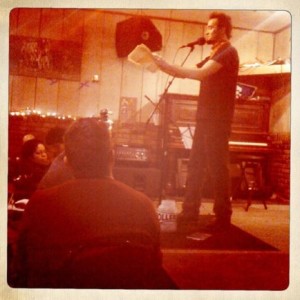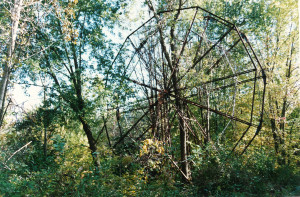 Tell us a bit about yourself and your debut chapbook How I Became an Angry Woman (Accents Publishing 2015).
Tell us a bit about yourself and your debut chapbook How I Became an Angry Woman (Accents Publishing 2015).
I grew up in Southeastern Kentucky, in this little area of creeks and hills off Highway 229, right at the Knox and Laurel county line. Very happy childhood, loving family, lots of laughter—my memories from that time are all gold and blue and green. I was an early and ravenous reader, and the urge to write for my own pleasure hit me when I was about 7 or 8. That’s when I wrote my first poem, and I have been hooked ever since.
How I Became an Angry Woman is comprised mostly of pieces I began working on during my early 20s while studying English at the University of Kentucky. Just as my first real romantic relationship was ending, my first real education in poetry was beginning. Dan Howell, my first poetry teacher at UK, and the students in that class, began chipping away all my bad poetry habits—crimes of ignorance, to be fair—and opening my eyes to the real work poetry could do. One day, at the beginning of class, Dan wrote Margaret Atwood’s poem “You Fit Into Me” on the board:
You fit into me
like a hook into an eye
a fish hook
an open eye
And it was like I had never seen color before. I took that new perception into the several consecutive poetry workshops I had with Jane Vance, whose significance to me can’t be fully described here. The book is dedicated to her to speak to that. She was an exceedingly generous teacher, mentor, and friend to me. She not only believed I had a voice worth hearing, but she helped me hone it in such a way that I began believing it too. Almost every poem in this book was read and workshopped by Jane, either in the classes I had with her or in our informal workshop of friends that continued after my graduation. Her encouragement helped me do things like intern for UK’s literary journal, Limestone, and submit my poem “Mood” to be considered for the Farquhar Award. And it won! It was through Jane, also, that I met so many other dear friends, with whom I am still engaged creatively today.
So How I Became an Angry Woman is a declaration of awakening. That’s why I chose the title from that poem, because it was most explicitly about waking up with a new vision, a new understanding, a new way of being. That’s what I experienced in more ways than one while writing and sharpening these pieces. I’m always becoming slightly new, I think; like every time I learn something, I relearn everything before or understand it a bit differently. So it’s incredibly difficult for me to declare anything the way the speaker of my poems can, and does. That is why I love poetry so much, because it gives you the chance to take feelings and moments that last barely a second in places inside you you’re usually too busy or too afraid to acknowledge, or an experience you’ve been wrestling with in secret forever, and proclaim it. I’m thrilled that Accents believed in these proclamations and gave me the chance to share them. This book was a dream I didn’t even admit I had until it became reality.
 What struck me most about your book is the voice. The speaker seems to explore the range and strength of anger, like it is a tool to be used in, and maybe with, love. How do the two, anger and love, work together for the speaker of these poems?
What struck me most about your book is the voice. The speaker seems to explore the range and strength of anger, like it is a tool to be used in, and maybe with, love. How do the two, anger and love, work together for the speaker of these poems?
The speaker of these poems would never have fully understood, or owned her anger had she not experienced the different shades of love. Though anger and love can both seem pure or basic, for her it’s not that simple. Her anger is at least half sadness, her love is almost entirely lust. As a woman she knows very well how often beauty is painful, how often love reveals ugliness. And though she desperately wants both, she is at times so frustrated by the difficulties and indignities of seeking, maintaining, and losing love, she wishes she didn’t. When she says “love is a grey madness/I was never good at/suffering,” she is speaking to that ambiguity, “the bliss and the sting/inseparable.” She becomes angry at her lovers, herself, the patriarchy, religion, literature, other women. Where she felt components of love to be deceitful, anger was wholly honest. And through the lens of that anger, she sees more clearly. Anger is her first real path to power, and begins to love herself for following it.
The speaker calls upon Plath and Whitman, as well as biblical and Shakespearian archetypes and allusions throughout the poems. Are these your own literary influences?
For a writer, I’m incredibly ill-read compared to my peers. But the Appalachian culture is one that involves a particular rhythm and pace of speech, rules of communication that definitely shape my writing. That accounts for the biblical language. That and a series of issues I have regarding images of women in something as culturally significant and pervasive as ancient religious texts. As if somehow, by taking words written by men for the purposes of men and putting them in a female speaker’s mouth, I am giving a voice to a voiceless collective.
When I was young, I was particularly captivated by Maya Angelou, I remember. But it wasn’t until college that I became truly familiar with other writers people my age had known for years. I would still be unlikely to catch witty references to a host of poets, I’m sure. However, the things I did read I learned to analyze and connect them to history, the world, and myself… The sense of connection is highly spiritual I think. References to other works act like a shorthand not only for the reader, but for me as well. Sometimes I could only mean what I mean because it was informed by that poet (Plath) or that line (Whitman’s “I sing the body electric”)! I love how art influences art. For example, “Ophelia” came from an exercise in one English class, I don’t know which. But we were looking at the work of the Pre-Raphaelites and the assignment was to write something in response to a painting of our choice. I was struck by the Sir John Everett Millais’ “Ophelia.” And by this point, I had read Hamlet a couple of times and was understanding it in new ways—it appeared to me that Ophelia suffered so much more deeply than Hamlet; it’s just that the play wasn’t about her. So I did the poem in three parts to get at the effect the character’s story and her image had on me. I later learned in Jane’s class that this was an exercise called “ekphrasis.”
My poetic style now comes firstly from my own instincts, but it is most definitely shaped by the tone and style of Margaret Atwood (I am always reading Morning in the Burned House), Sylvia Plath, and Jane Vance, if I were to pick just a few out of many.
I’ve heard it said that writing about sex can be difficult because the words we have are either too medical or too gratuitous. How did you go about tackling the language in “I don’t know why I sucked your dick” and “In My Fuck Me Shoes.”
I actually didn’t even think about it until after it was already on the page. Both of the poems came to me almost fully formed. I generally struggle with titles but these two poems titled themselves first thing. I used language I felt to be accurate and delightful, both for the image and the cadence. It was only after writing the pieces that I started to feel a bit shy about reading them, or having anyone else read them. But ultimately, I’m not ashamed to say I loved them and believed in them so much—especially “In My Fuck Me Shoes”—that I wanted to share. I think I’m also really pleased that, without intending to, I crafted some pieces that present a truth for my speaker about two things that can seem to disempower women in heterosexual politics—high heels and giving oral sex—and I show how she felt very powerful, almost hedonist in one and indifferent in another. There are so many facets to all parts of the human experience, and sex is no different. The more depictions of the various truths about sex that are out there, in the cloud and the consciousness, the better. Especially for women.
What or who inspires you to write?
There’s this thing that happens, an impulse, before I write most of my poems, when a word, a line, or the form of a poem just come to me in an instant and I feel compelled to jot it down. It comes from dreams, memories, specific experiences, moods (usually bad ones), conversations, movies, music, relationships, workshops, other things I’m reading…One of the best things for my writing is when I’m given a prompt with limits to work within. I haven’t attempted that in a long time. I don’t think it would surprise you to know I write especially well when I’m either angry or blue…and of course, any time I put wine to my lips I get the urge to put pen to paper. Also, I have many creative acquaintances and friends, like the very dear and talented Sue Churchill, who is continually inspiring me to keep writing.
Are you currently working on any projects we can look forward to?
I am attempting some prose for the first time in many, many years. And I’m thinking of a collection of body poems. It seems to be a theme that keeps presenting itself…
Bianca Bargo was born to a loving family in Knox County, Kentucky. She earned her B.A. in English from the University of Kentucky, where she discovered and honed her poetic voice, winning UK’s Farquhar Poetry Award and serving as Managing Editor of Limestone: A Journal of Art and Literature in 2009. From 2010-2014 as she spent her time working in retail and public education and obtaining her MA.Ed. from Eastern Kentucky University, Bianca continued to write and enjoy poetry with the inspiration and support of Lexington’s poetry scene. Her work has been published in Accents Publishing’s Bigger Than They Appear: Anthology of Very Short Poems. She currently resides in Lexington, Kentucky with her husband Micah and their pets. She has yet to Figure everything out, but continues to work on it while trusting kindness and curiosity to lead the way.






















